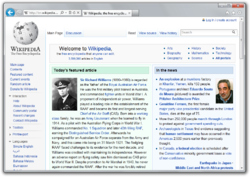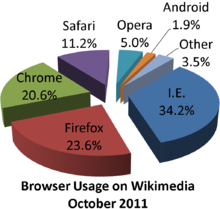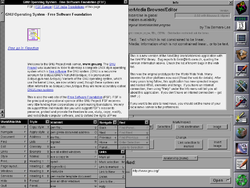- Web browser
-
A web browser is a software application for retrieving, presenting, and traversing information resources on the World Wide Web. An information resource is identified by a Uniform Resource Identifier (URI) and may be a web page, image, video, or other piece of content.[2] Hyperlinks present in resources enable users easily to navigate their browsers to related resources. A web browser can also be defined as an application software or program designed to enable users to access, retrieve and view documents and other resources on the Internet.
Although browsers are primarily intended to access the World Wide Web, they can also be used to access information provided by web servers in private networks or files in file systems.
The major web browsers are Internet Explorer, Firefox, Google Chrome, Safari, and Opera.[3]
Contents
History
The history of the web browser dates back to the late 1980s, when a variety of technologies laid the foundation for the first web browser, WorldWideWeb, by Tim Berners-Lee in 1991. That browser brought together a variety of existing and new software and hardware technologies.
The introduction of the NCSA Mosaic web browser in 1993 – one of the first graphical web browsers – led to an explosion in web use. Marc Andreessen, the leader of the Mosaic team at NCSA, soon started his own company, named Netscape, and released the Mosaic-influenced Netscape Navigator in 1994, which quickly became the world's most popular browser, accounting for 90% of all web use at its peak (see usage share of web browsers).
Microsoft responded with its Internet Explorer in 1995 (also heavily influenced by Mosaic), initiating the industry's first browser war. Bundled with Windows, Internet Explorer gained dominance in the web browser market; Internet Explorer usage share peaked at over 95% by 2002.[5]
Opera debuted in 1996; although it has never achieved widespread use, having less than 1% browser usage share as of February 2009 according to Net Applications,[6] having grown to 2.14 in April 2011 its Opera-mini version has an additive share, in April 2011 amounting to 1.11 % of overall browser use, but focused on the fast-growing mobile phone web browser market, being preinstalled on over 40 million phones. It is also available on several other embedded systems, including Nintendo's Wii video game console.
In 1998, Netscape launched what was to become the Mozilla Foundation in an attempt to produce a competitive browser using the open source software model. That browser would eventually evolve into Firefox, which developed a respectable following while still in the beta stage of development; shortly after the release of Firefox 1.0 in late 2004, Firefox (all versions) accounted for 7.4% of browser use.[5] As of August 2011, Firefox has a 27.7% usage share.[6]
Apple's Safari had its first beta release in January 2003; as of April 2011, it has a dominant share of Apple-based web browsing, accounting for just over 7.15% of the entire browser market.[6]
The most recent major entrant to the browser market is Google's Chrome, first released in September 2008. Chrome's take-up has increased significantly year on year, by doubling its usage share from 7.7 percent to 15.5 percent by August 2011. This increase seems largely to be at the expense of Internet Explorer, whose share has tended to decrease from month to month.[7]
Function
The primary purpose of a web browser is to bring information resources to the user. This process begins when the user inputs a Uniform Resource Locator (URL), for example http://en.wikipedia.org/, into the browser. The prefix of the URL determines how the URL will be interpreted. The most commonly used kind of URI starts with http: and identifies a resource to be retrieved over the Hypertext Transfer Protocol (HTTP). Many browsers also support a variety of other prefixes, such as https: for HTTPS, ftp: for the File Transfer Protocol, and file: for local files. Prefixes that the web browser cannot directly handle are often handed off to another application entirely. For example, mailto: URIs are usually passed to the user's default e-mail application, and news: URIs are passed to the user's default newsgroup reader.
In the case of http, https, file, and others, once the resource has been retrieved the web browser will display it. HTML is passed to the browser's layout engine to be transformed from markup to an interactive document. Aside from HTML, web browsers can generally display any kind of content that can be part of a web page. Most browsers can display images, audio, video, and XML files, and often have plug-ins to support Flash applications and Java applets. Upon encountering a file of an unsupported type or a file that is set up to be downloaded rather than displayed, the browser prompts the user to save the file to disk.
Information resources may contain hyperlinks to other information resources. Each link contains the URI of a resource to go to. When a link is clicked, the browser navigates to the resource indicated by the link's target URI, and the process of bringing content to the user begins again.
Features
Available web browsers range in features from minimal, text-based user interfaces with bare-bones support for HTML to rich user interfaces supporting a wide variety of file formats and protocols. Browsers which include additional components to support e-mail, Usenet news, and Internet Relay Chat (IRC), are sometimes referred to as "Internet suites" rather than merely "web browsers".[8][9][10]
All major web browsers allow the user to open multiple information resources at the same time, either in different browser windows or in different tabs of the same window. Major browsers also include pop-up blockers to prevent unwanted windows from "popping up" without the user's consent.[11][12][13][14]
Most web browsers can display a list of web pages that the user has bookmarked so that the user can quickly return to them. Bookmarks are also called "Favorites" in Internet Explorer. In addition, all major web browsers have some form of built-in web feed aggregator. In Firefox, web feeds are formatted as "live bookmarks" and behave like a folder of bookmarks corresponding to recent entries in the feed.[15] In Opera, a more traditional feed reader is included which stores and displays the contents of the feed.[16]
Furthermore, most browsers can be extended via plug-ins, downloadable components that provide additional features.
User interface
Most major web browsers have these user interface elements in common:[17]
- Back and forward buttons to go back to the previous resource and forward respectively.
- A refresh or reload button to reload the current resource.
- A stop button to cancel loading the resource. In some browsers, the stop button is merged with the reload button.
- A home button to return to the user's home page.
- An address bar to input the Uniform Resource Identifier (URI) of the desired resource and display it.
- A search bar to input terms into a search engine.
- A status bar to display progress in loading the resource and also the URI of links when the cursor hovers over them, and page zooming capability.
Major browsers also possess incremental find features to search within a web page.
Privacy and security
Most browsers support HTTP Secure and offer quick and easy ways to delete the web cache, cookies, and browsing history. For a comparison of the current security vulnerabilities of browsers, see comparison of web browsers.
Standards support
Early web browsers supported only a very simple version of HTML. The rapid development of proprietary web browsers led to the development of non-standard dialects of HTML, leading to problems with interoperability. Modern web browsers support a combination of standards-based and de facto HTML and XHTML, which should be rendered in the same way by all browsers.
Extensibility
A browser extension is a computer program that extends the functionality of a web browser. Every major web browser supports the development of browser extensions.
See also
- Browse
- Browser wars
- Geobrowsing
- Internet suite
- Layout engine
- List of web browsers
- Mobile browser
- Timeline of web browsers
- Usage share of web browsers
- Web browser comparison
References
- ^ "Browser Market Share". Net Applications. http://marketshare.hitslink.com/browser-market-share.aspx?spider=1&qprid=0. Retrieved 29 July 2011.
- ^ Jacobs, Ian; Walsh, Norman (15 December 2004). "URI/Resource Relationships". Architecture of the World Wide Web, Volume One. World Wide Web Consortium. http://www.w3.org/TR/webarch/#id-resources. Retrieved 30 June 2009.
- ^ "Browser". Mashable. http://mashable.com/follow/topics/browser/. Retrieved September 2, 2011.
- ^ Stewart, William. "Web Browser History". http://www.livinginternet.com/w/wi_browse.htm. Retrieved 5 May 2009.
- ^ a b http://www.searchenginejournal.com/mozilla-firefox-internet-browser-market-share-gains-to-74/1082/
- ^ "Internet Explorer usage to plummet below 50 percent by mid-2012". September 3, 2011. http://www.digitaltrends.com/web/internet-explorer-usage-to-plummet-below-50-percent-by-mid-2012/attachment/net-applications-browser-market/. Retrieved September 4, 2011.
- ^ "The SeaMonkey Project". Mozilla Foundation. 7 November 2008. http://www.seamonkey-project.org/. Retrieved 30 June 2009.
- ^ "Cyberdog: Welcome to the 'doghouse!". 5 July 2009. http://www.cyberdog.org/. Retrieved 30 June 2009.
- ^ Teelucksingh, Dev Anand. "Interesting DOS programs". Opus Networkx. http://www.opus.co.tt/dave/internet.htm. Retrieved 30 June 2009.
- ^ Andersen, Starr; Abella, Vincent (15 September 2004). "Part 5: Enhanced Browsing Security". Changes to Functionality in Microsoft Windows XP Service Pack 2. Microsoft. http://technet.microsoft.com/en-us/library/bb457150.aspx#EEAA. Retrieved 30 June 2009.
- ^ "Pop-up blocker". Mozilla Foundation. http://support.mozilla.com/en-US/kb/Pop-up+blocker. Retrieved 30 June 2009.
- ^ "Safari: Using The Pop-Up Blocker". Mac Tips and Tricks. WeHostMacs. 2004. http://www.mactipsandtricks.com/tips/display.lasso?mactip=137. Retrieved 30 June 2009.
- ^ "Simple settings". Opera Tutorials. Opera Software. http://www.opera.com/browser/tutorials/settings/#tabs. Retrieved 30 June 2009.
- ^ Bokma, John. "Mozilla Firefox: RSS and Live Bookmarks". http://johnbokma.com/firefox/rss-and-live-bookmarks.html. Retrieved 30 June 2009.
- ^ "RSS newsfeeds in Opera Mail". Opera Software. http://www.opera.com/mail/rss/. Retrieved 30 June 2009.
- ^ "About Browsers and their Features". SpiritWorks Software Development. http://www.about-the-web.com/shtml/browsers.shtml. Retrieved 5 May 2009.
External links
- Architecture of the World Wide Web, Volume One
- Existing browsers
- WorldWideWeb: Proposal for a HyperText Project
Categories:- Web browsers
Wikimedia Foundation. 2010.



